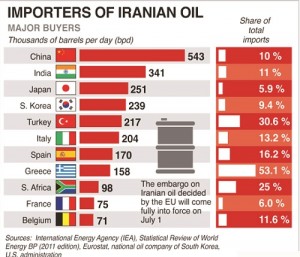Iran’s Gain May Spell Doom For Nigeria’s Crude Oil Exports
 The cloud seems to be getting dark for Nigerian’s crude export as the prospects of lifting sanctions on Iran in 2016 amidst global dwindling oil price.
The cloud seems to be getting dark for Nigerian’s crude export as the prospects of lifting sanctions on Iran in 2016 amidst global dwindling oil price.
The Iran deal will lead to more supply of crude oil in the International market by 2016-2017. Iran is a major crude oil producer and not a member of OPEC. So far the economic sanctions have limited how much crude oil Iran could produce and which countries could buy crude oil from Iran. For example in 2013, India was mandated to reduce its crude oil purchases from Iran.
Iran’s loss was Nigeria’s gain as India increased purchase of Nigerian crude oil and became the top buyer of Nigerian crude in the world. Currently India buys 745,000 barrel of crude from Nigeria everyday which is foreign exchange earnings of $ 43 million for Nigeria daily. Sanctions had meant that India could import no more than 9 million tonnes of crude oil this year the same volume it had shipped from Iran in 2013-15.
With the prospects of lifting of sanctions on Iran in 2016, that demand from countries like India could shift back to Iran which has historically sold its crude at a discount to the International crude oil prices.
Crude oil prices declined immediately after the Iran deal was announced but then rose as traders realized that the Iranian crude oil supply will not hit International markets for some time.
Iran produces close to 3 million barrels of crude per day and that level of production is after the impact of sanctions that limit their production. It also has about 35 million barrels of oil in storage currently in vast floating tankers ready to be exported at any time. When the sanctions are lifted in 2016 this production could rise over 4 million barrels per day. So although there is no immediate increase in supply in International market we can expect that increase in supply to come in Q3 2016 onward.
The outlook for crude oil prices for 2016 just turned negative and traders expect prices to decline further because of increase in supply.
For Nigeria, it is important to sign long term future agreements with its current buyers to risk losing them in future.







